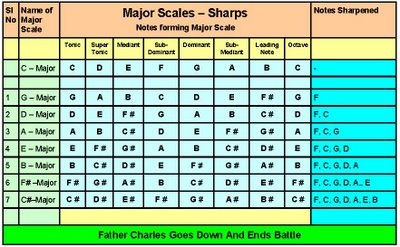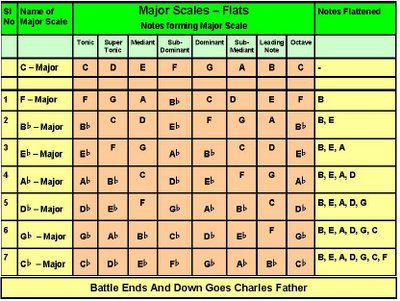Monday, June 12, 2006
Lesson-29: Why So Many Majors ?
So far we have seen all the Major scales possible with Sharps and Flats.
C-Major and 7 other majors with sharps and 7 other Majors with Flats. Total 15 Major scales, have been summarised below:


As we know, there are 7 white notes and 5 black notes in an octave, out of these 15 Majors, some 3 Major scales are repetitive also.
I could certainly feel a query that is in the back of all of your mind all these time…., and wanted to pose it to me anytime now…! …
The question may be something like this …:
“You told about the Major scale that started in C and conveniently I can get it with all adjacent white notes…!
Then why at all you bother me with G-Major, D-Major etc etc.. and getting into those black notes ….trouble to learn both theoretically as well as practically…
If I could play a song in major scale in C-Major, why at all I shall bother to play the same song in some other Major scale….
after all everything is Major scale … and the same… same….. saaaaaame……… major scale…."
Well, frankly speaking I was also puzzled, during my learning time with the same query.
And to some extent, still remain puzzled with the limitations WCM exponents have posed for themselves with One Major scale ( represented in different starting keys…)
[and One Harmonic Minor scale and One Melodic Minor scale (again represented in different starting keys each time)…! (Minor scales… we will learn soon…)]
Certain guessing answers I can make… in order to clarify the above query…May be right .. May not be right also…! But let me try...!
We have seen that the range of voice of each human being is different…!
So different starting point to suit the each individual is necessary…!
All music rules normally take care of such human factor utmost…!
That way different starting point for the same Scale might have been envisaged…! That forms one answer !
Another answer is the concept of Modulation !
WCM strongly advises to change the induced monotony in a song in the same scale, by shifting to other scale which is very nearby….
Meaning try to change only one note at a time and shift to another scale..!
Such process of changing is called Modulation…!
(A technique strongly supported by WCM…but strongly opposed by Carnatic scheme ! )
For example….if you are playing C major for quite some time… show some change by shifting to nearby G-Major…which is just effected by change of F to F# as far as key is concerned…
But now you shall categorically know… that by doing so, we have shifted the Tonic from C to G…..
and thus old Tonic (C) has become the new Sub-Dominant……
old Supertonic (D) has become the new Dominant etc….etc. etc…
Even though you are still playing some form of Major scale only, still you can feel some difference due to the Tonic shift…
One good example of "simple" modulation in old song of MSV which is a Minor scale song..…is Raajavin Paarvai Raaniyin pakkam…!
There will be some shifting of tonic effected by a Chorus and instruments in one of the interludes….!
Another "simple" example is ARR's "Oooh Lalal Laa!" of Minsaarak Kanavu. At the end of song, we can hear this modulation with chorus voices!
So you can travel from C-Major to G-Major with ease and come back to C-Major again with ease….Do you agree that…?
Instead of coming back…… if you want to go further upward side from GMajor….. where you can go…?
You can easily guess that D-major is the next easier to reach with ONE note modification of C to C# now….!
Again tonic shift etc etc happens…. but that's smooth transition…!
Similarly,one can chaneg from Major scale to Minor Scale and back !
IR always uses such complex type of modulations in almost all of his songs! That will be mind blowing to watch and listen!
So WCM breaks the monotony in their own way….! The pattern of Major or Minor scale is still same! But some tonal color changes…makes it afresh…!
We will see in detail about Modulation later….!
What I just wanted to show you…is...that …some approach of WCM needs these different type of Major Scales….!
Soon We will start with Minor Scales !
C-Major and 7 other majors with sharps and 7 other Majors with Flats. Total 15 Major scales, have been summarised below:


As we know, there are 7 white notes and 5 black notes in an octave, out of these 15 Majors, some 3 Major scales are repetitive also.
I could certainly feel a query that is in the back of all of your mind all these time…., and wanted to pose it to me anytime now…! …
The question may be something like this …:
“You told about the Major scale that started in C and conveniently I can get it with all adjacent white notes…!
Then why at all you bother me with G-Major, D-Major etc etc.. and getting into those black notes ….trouble to learn both theoretically as well as practically…
If I could play a song in major scale in C-Major, why at all I shall bother to play the same song in some other Major scale….
after all everything is Major scale … and the same… same….. saaaaaame……… major scale…."
Well, frankly speaking I was also puzzled, during my learning time with the same query.
And to some extent, still remain puzzled with the limitations WCM exponents have posed for themselves with One Major scale ( represented in different starting keys…)
[and One Harmonic Minor scale and One Melodic Minor scale (again represented in different starting keys each time)…! (Minor scales… we will learn soon…)]
Certain guessing answers I can make… in order to clarify the above query…May be right .. May not be right also…! But let me try...!
We have seen that the range of voice of each human being is different…!
So different starting point to suit the each individual is necessary…!
All music rules normally take care of such human factor utmost…!
That way different starting point for the same Scale might have been envisaged…! That forms one answer !
Another answer is the concept of Modulation !
WCM strongly advises to change the induced monotony in a song in the same scale, by shifting to other scale which is very nearby….
Meaning try to change only one note at a time and shift to another scale..!
Such process of changing is called Modulation…!
(A technique strongly supported by WCM…but strongly opposed by Carnatic scheme ! )
For example….if you are playing C major for quite some time… show some change by shifting to nearby G-Major…which is just effected by change of F to F# as far as key is concerned…
But now you shall categorically know… that by doing so, we have shifted the Tonic from C to G…..
and thus old Tonic (C) has become the new Sub-Dominant……
old Supertonic (D) has become the new Dominant etc….etc. etc…
Even though you are still playing some form of Major scale only, still you can feel some difference due to the Tonic shift…
One good example of "simple" modulation in old song of MSV which is a Minor scale song..…is Raajavin Paarvai Raaniyin pakkam…!
There will be some shifting of tonic effected by a Chorus and instruments in one of the interludes….!
Another "simple" example is ARR's "Oooh Lalal Laa!" of Minsaarak Kanavu. At the end of song, we can hear this modulation with chorus voices!
So you can travel from C-Major to G-Major with ease and come back to C-Major again with ease….Do you agree that…?
Instead of coming back…… if you want to go further upward side from GMajor….. where you can go…?
You can easily guess that D-major is the next easier to reach with ONE note modification of C to C# now….!
Again tonic shift etc etc happens…. but that's smooth transition…!
Similarly,one can chaneg from Major scale to Minor Scale and back !
IR always uses such complex type of modulations in almost all of his songs! That will be mind blowing to watch and listen!
So WCM breaks the monotony in their own way….! The pattern of Major or Minor scale is still same! But some tonal color changes…makes it afresh…!
We will see in detail about Modulation later….!
What I just wanted to show you…is...that …some approach of WCM needs these different type of Major Scales….!
Soon We will start with Minor Scales !
Comments:
<< Home
I came across this blog by chance. Being a fan of IR myself, I am delighted. I really like IR for the scale modulation in almost every song (esp in the second interlude), and haven't come across this prowess even among composers in the West.
Keep up the good work!
Post a Comment
Keep up the good work!
<< Home

